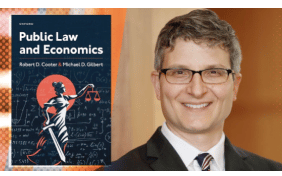
When Ronald Coase and Guido Calabresi pioneered the application of economics to law in the early 1960s, they pushed efficiency, incentives and the iconic “rational actor” — one who behaves rationally to pursue his preferences — to the forefront of private law fields such as torts, contracts and property.
Michael D. Gilbert, a UVA Law professor and the school’s vice dean, has teamed up with his mentor and former professor, Robert D. Cooter of the University of California, Berkeley, to take that analysis one step further by applying economic theory to the realm of public law. Their new textbook, “Public Law and Economics,” will be published by Oxford University Press this month.
While it may seem counterintuitive to apply economic analysis to fields that don’t involve a focus on money or numbers, the book is an extension of the past 60 years of law and economics scholarship, Gilbert said.
“Many people believe that economics has no place in public law because it’s concerned with dollars and cents, but that’s a misunderstanding,” Gilbert said. “Economics is built on a much deeper conception of the social good than that. Even if you reject that conception, you should still care about economics because of its focus on incentives. Law usually aims to change people’s behavior, and it’s easier to accomplish that with a thorough understanding of incentives.”
The book was written over the course of six years, and much of the authors’ time was spent figuring out how to organize the text into coherent and digestible topics that apply universally.
“Public law encompasses everything from international treaties to the separation of governmental powers to the speed limits that we probably all violated on our way to work this morning,” Gilbert said. “There’s too much there to organize the book by legal topic, so we decided to organize it around what we think of as fundamental processes of governance.”
The authors concluded that “just about every public law from these grand treaties down to those speed limits is the product of one or more of six fundamental processes,” Gilbert said. “If you understand the economic forces behind these fundamental processes of lawmaking — bargaining, voting, entrenching, delegating, adjudicating and enforcing — you’ll understand a lot about public law.”
Gilbert and Cooter’s goal is not necessarily to lay out policy prescriptions but rather to use economic analysis to equip readers to think about why public laws and regulations are enacted and whether they are likely to achieve their goals.
Take, for example, a law requiring people to publicly disclose their political contributions. A litigant might argue that it violates the freedom of speech, while the state would defend the law by claiming that disclosure reduces the risk of corruption.
Looking at the law through the lens of economics reveals a surprise, Gilbert said.
“Disclosure feeds information to the public and allows people to track crooked deals,” Gilbert said. “That’s good. But it also feeds information to corrupt actors: Who’s buying, who’s selling and at what price.”
All markets, including illegal markets, need information to function, he added, so “in deciding whether disclosure combats corruption, the question is whether the gains from transparency exceed any losses that accrue when we grease the market for bribes.”
Among other implications, Gilbert said, “this reasoning calls into question the Supreme Court’s conclusion that campaign finance disclosure can keep corruption in check.”
Cooter is a pioneer in law and economics and a recipient of the Ronald H. Coase medal, which is awarded in recognition of major contributions to the field. He was a founding director of the American Law and Economics Association and co-founded the Latin American and Caribbean Law and Economics Association. He is the co-author of at least three other books — including “Law and Economics” — and he has published a wide variety of articles applying economic analysis to private law, constitutional law and law in developing countries.
Gilbert was the inaugural director of the Law School’s Center for Public Law and Political Economy and is a member of the Democracy Initiative’s Corruption Lab for Ethics, Accountability, and the Rule of Law. He has won UVA’s All-University Teaching Award and the Student Council Distinguished Teaching Award.
Gilbert already incorporates economic theory into his political law classes, including Regulation of the Political Process and Constitutional Law and Economics, but the new book is designed to make the economic insights and tools available to professors and their students and also a broader audience, including researchers, scholars and policymakers. To accomplish that goal, Cooter and Gilbert arranged for an open access agreement to make the book available online for free.
Ironically, they spent six years laboring on a book for no economic return, suggesting that the rational actor may indeed be mythical. But Gilbert explains that tension through the same lens he and Cooter have applied to analyzing public law: The arrangement satisfies each party’s preferences.
“This was never going to be a money-making enterprise — we don’t care about that,” Gilbert said. “We could have done it the conventional way and we would’ve gotten a few hundred dollars in royalties every year. But we don’t want the money; we want people to use the book. The open access agreement is an investment, and we think it’s a pretty good one.”
Founded in 1819, the University of Virginia School of Law is the second-oldest continuously operating law school in the nation. Consistently ranked among the top law schools, Virginia is a world-renowned training ground for distinguished lawyers and public servants, instilling in them a commitment to leadership, integrity and community service.
Source: https://www.law.virginia.edu/news/202209/professors-new-book-provides-economic-analysis-public-law




